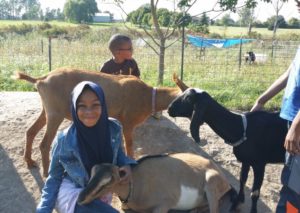The question of socialization comes up often in conversations about homeschooling. Parents who are new to homeschooling or considering it as a future option may recognize that school provides more than just academics. They may worry about how they will recreate those other learning opportunities in their home. Well-meaning neighbors and family members may ask, “But what about socialization?” Well, what about it?
What is socialization, anyway?
Societies have an interest in making sure the younger generation has the social skills and expectations needed to fit in with and be productive members of the group. The Oxford Learners Dictionary defines socialization as the process by which somebody, especially a child, learns to behave in a way that is acceptable in their society. Many people expect schools to do the job of seeing children through this process of becoming acceptably behaved citizens who understand the norms of their society and how to fit in without being a burden to the community. So they might wonder how homeschoolers will gain these skills outside of school.
Is this something I need to worry about?
Not at all. If you and your children are involved in activities with a range of other people, your children will have many opportunities for healthy social development. In fact, some people assert that the kinds of social learning situations that occur in the classroom and on the playground impart a very different skill set than what children will actually need as adults. Typical schools group children by age and developmental ability, resulting in large groups of children who all have similar skills—and shared deficiencies.
 In contrast, homeschoolers tend to interact with more diverse groups and individuals. So they are able to gain new skills from people who are much more socially adept and affirm those skills by mentoring those who are younger or less experienced. The more socially experienced members of the group provide a model for the others to learn from. This is a valuable form of socialization that is not usually part of social learning in a group of same-age children.
In contrast, homeschoolers tend to interact with more diverse groups and individuals. So they are able to gain new skills from people who are much more socially adept and affirm those skills by mentoring those who are younger or less experienced. The more socially experienced members of the group provide a model for the others to learn from. This is a valuable form of socialization that is not usually part of social learning in a group of same-age children.
How can I meet my child’s needs for socialization? How do others families do this?
Socialization and community building can happen in any situation you can think of where your children are interacting with other people. Music lessons, art classes, sports teams, church groups, scouting, 4-H, wilderness groups, summer camps, mission work, community activism, and all sorts of other activities provide the opportunity for homeschoolers to interact with others and develop interpersonal skills. If your child needs more social opportunities, they’ll let you know. You might seek out a homeschool group in your area or start one if one doesn’t already exist. There may be volunteer opportunities at a local nursing home or daycare center where your child can learn from elders and/or mentor younger children. If you live in a very isolated area, you might consider using the Internet or a pen-pal arrangement as a way for your child to connect with others socially through the written word.
What do I say to family/friends who press the issue?
Well-meaning family and friends may react with concern. Sometimes it can be helpful to dig a bit deeper to uncover their fears and respond from there. What exactly are they worried about? What social skills do they think will be missing from your child’s experience? Perhaps a simple explanation of how you will fill that gap is all they need to hear.
When you choose to homeschool, you may appear to be removing your child from the community’s collective method of raising its children. People may wonder if this means your family will now become isolated. They may assume that your child will be at home all day and will not have enough of a chance to develop and practice social skills. They may know adults who are unable to function in a socially appropriate way, and although there is no reason to connect this outcome with homeschooling, they may wonder if there could be a connection.
 They may be concerned about homeschooling simply because they do not have any experience (yet!) with healthy, well-adjusted, well-socialized homeschoolers. It’s likely that they were indoctrinated with the belief that schools are the only place where children can learn what they need to know to succeed socially. Homeschoolers typically prove that wrong, but it may take some time for the people in your life to see that evidence unfold. It may help to remember that these questions are generally posed out of love and concern for your child’s well-being. Be patient with the process and assure them that with your attentive care, your children are doing fine.
They may be concerned about homeschooling simply because they do not have any experience (yet!) with healthy, well-adjusted, well-socialized homeschoolers. It’s likely that they were indoctrinated with the belief that schools are the only place where children can learn what they need to know to succeed socially. Homeschoolers typically prove that wrong, but it may take some time for the people in your life to see that evidence unfold. It may help to remember that these questions are generally posed out of love and concern for your child’s well-being. Be patient with the process and assure them that with your attentive care, your children are doing fine.
How do I make sure my children get what they need?
Decide for yourself what social and behavioral skills you feel are essential for your child to learn. Consider your child’s developmental level as you set your expectations. Stay tuned in to your child and his or her needs, and follow your inner compass in figuring out how best to meet those needs. Make connections with others in your community and include your children in those interactions. Model socially appropriate behavior in different situations and support your children as they practice interacting with various people.
Many homeschoolers find that socialization comes easily and naturally as part of their everyday interactions with others. So the next time a well-meaning friend asks, “But what about socialization?” just smile and invite them to become part of your child’s ever-expanding social network.